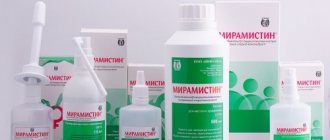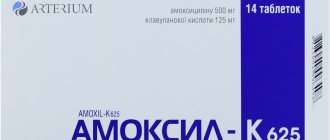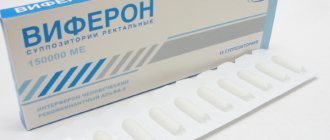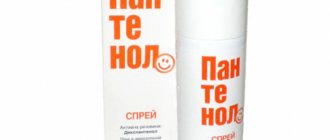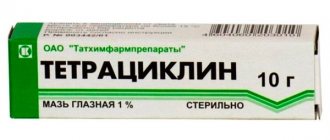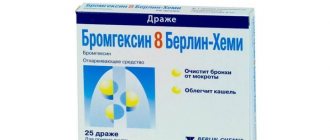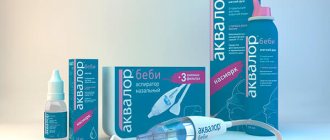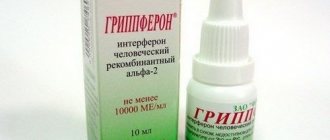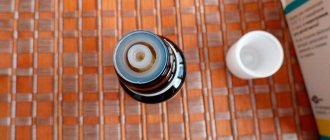Release form and composition
Dosage forms of Rinorus:
- nasal drops: colorless or with a slightly yellowish tint, transparent, with the smell of eucalyptus (in polymer dropper bottles of 5 or 10 ml, in a cardboard box 1 dropper bottle);
- nasal spray: colorless or with a slightly yellowish tint, transparent, with the smell of eucalyptus (10 or 20 ml in plastic bottles with a spray nozzle and a cap, 1 bottle in a cardboard box);
- nasal gel: colorless or with a slightly yellowish tint, transparent (5, 10 or 15 g in aluminum tubes, 1 tube in a cardboard box).
Composition of 1 ml drops and spray Rinorus:
- active substance: xylometazoline hydrochloride – 0.5 or 1 mg;
- auxiliary components: benzalkonium chloride – 0.1 mg; sodium chloride – 5 mg; edetate disodium – 0.5 mg; sodium dihydrogen phosphate dihydrate – 6 mg; sodium hydrogen phosphate dodecahydrate – 3.5 mg; eucalyptus oil – 0.85 mg; water for injection – up to 1 ml.
Composition of 1000 mg Rinorus gel:
- active substance: xylometazoline hydrochloride – 0.5 or 1 ml;
- auxiliary components: sodium chloride – 5 mg; hyaetellose – 20 mg; benzalkonium chloride – 0.1 mg; disodium edetate dihydrate – 0.5 mg; disodium phosphate dodecahydrate – 3.5 mg; sodium dihydrogen phosphate dihydrate – 6 mg; sorbitol – 20 mg; glycerol – 40 mg; purified water – up to 1000 mg.
Pharmacodynamics and pharmacokinetics
The active ingredient of Rinorus xylometazoline drops and spray is a decongestant with adrenomimetic activity. It has a stimulating effect on alpha-adrenergic receptors of blood vessels, which leads to their narrowing and a decrease in the severity of swelling of the mucous membrane in the area of application of the drug. The therapeutic effect is to reduce swelling, hyperemia (increased blood supply to the vessels) of the mucous membrane of the nasal cavity and paranasal sinuses, thereby restoring nasal breathing.
The therapeutic effect is achieved within 10 minutes after administration of the drug and lasts for 10 hours. Xylometazoline can be partially absorbed into the systemic circulation.
Pharmacological properties
Pharmacodynamics
Rhinorus is one of the vasoconstrictor drugs for local use in ENT practice.
The active substance - xylometazoline - is an alpha-adrenergic agonist that causes a narrowing of the blood vessels of the nasal mucosa, which helps eliminate swelling and hyperemia, restore the patency of the nasal passages, facilitate nasal breathing and improve the discharge of nasal discharge during rhinitis (runny nose) of various etiologies.
The effect of the drug develops a few minutes after use, its duration is up to 10 hours.
Pharmacokinetics
Rhinorus is practically not absorbed, and therefore its plasma concentration in the blood is very low.
"Rinorus": instructions for use of spray and drops for children and adults, analogues
RINORUS nasal solution is designed to constrict blood vessels and facilitate breathing through the nose. The availability of the drug and simple instructions for use make Rinorus more profitable compared to its analogues. When using the drug for mono- or combination therapy, contraindications must be taken into account and the recommended dosage must be observed.
Composition and release form
The vasoconstrictor is available in the form of a nasal spray and drops in various concentrations (0.05 and 0.1%). Regardless of the form, the liquid is colorless and transparent, with the aroma of eucalyptus oil.
The main active ingredient in nasal solutions is xylometazoline hydrochloride. Secondary ingredients are sodium chloride, eucalyptus oil, disodium edetate and benzalkonium chloride.
pharmachologic effect
'Rinorus' is included in the category of vasoconstrictor agents of local influence. The drug has an alpha-adrenomimetic effect and contracts the blood vessels of the mucous membrane, thereby reducing swelling and preventing excessive blood circulation.
After introducing the solution, a temporary protective layer is formed on the surface of the mucous membrane, repelling harmful microorganisms coming from the outside. The course of treatment helps restore the permeability of the nostrils and facilitate the breathing process.
Pharmacokinetics
The effect of the solution on the mucous membrane occurs a few minutes after administration. The effect of the drug lasts for 10 hours. When applied topically, the drug is practically not absorbed into the mucous membrane, so its content in the blood plasma is minimal.
Indications for use
The therapeutic properties of the nasal solution have a beneficial effect in the fight against infectious diseases.
These include the following:
- Acute rhinitis caused by an allergic reaction or respiratory diseases;
- Sinusitis;
- Otitis media;
- Eustachites.
The 'rhinoceros' is also used to prepare a person for surgery in the nasal passages and to facilitate rhinoscopy. The drug is suitable for use as part of complex therapy and for preventive purposes.
In most cases, a blocked nose is the main sign of infection, which can be controlled with the help of 'Rinor'. Nasal congestion occurs when a virus or bacteria enters the mucous membrane during inhalation. In response to the appearance of microorganisms, vasodilation occurs, which leads to inflammation of the mucous membranes and complicates the respiratory process.
The use of spray or drops is prohibited for tachycardia, glaucoma, hyperthyroidism and severe atherosclerosis. There are other contraindications:
- a history of surgical interventions on the brain membrane;
- hypersensitivity to individual components of the drug, including the main active ingredient;
- intolerance to xylometazoline hydrochloride;
- The patient's age is up to 2 years.
Using the drug without contraindications increases the risk of side effects. They consist of dry or irritated mucous membranes, a burning sensation, sneezing, and increased secretion of mucus. As a result of long-term therapy and high doses of depression, migraines, vomiting, rapid heartbeat, decreased vision.
If standard doses are exceeded, the drug may affect the patient's ability to concentrate, drive, and perform potentially hazardous work that requires quick response.
If side effects are observed, treatment should be temporarily suspended and a doctor should be consulted to determine further therapy. Using rhinor after side effects may cause complications.
Application
Please read the instructions for use before starting therapy. When treating with a nasal spray, it is enough to follow these steps:
- Remove the protective cap from the sprinkler and press the sprayer several times until a spray with a cloud of solution forms.
- Place the opening of the bottle into the nostril, hold it upright and inject the medicine once.
- Inhale the solution and repeat the procedure with the second nasal passage.
- Close the bottle tightly so that the drug does not lose its properties with constant contact with air.
Do not spray horizontally or downward as the medication will not reach the desired areas and the effectiveness of the treatment will be reduced. When spraying children, it is recommended to use a solution with a concentration of 0.05%. The duration of treatment with one spray is 5-7 days.
To use nasal drops, you need to clear any accumulated mucus from your nostrils, then tilt your head back and apply the product. The optimal dosage is 1-2 drops per nasal passage. The procedure should be performed no more than 3 times a day. Duration of therapy is 3-5 days in a row.
After completing the course of treatment, the doctor may prescribe secondary therapy.
Use during pregnancy
'Nose nose drops' in the form of nasal drops should not be used when carrying a child. The spray should be used to combat infections during pregnancy only if the intended benefit outweighs the possible risk to the fetus. Standard doses should not be exceeded.
The drug should be used with caution during breastfeeding. It is recommended to reduce the dosage and carry out treatment under close medical supervision.
Overdose
Use of the drug in large doses leads to increased blood pressure, disruption of sinus rhythm and low body temperature.
There is also the possibility of increased side effects. In case of overdose, treatment of symptoms is necessary.
If the dose is not maintained at a constant level, the physician must adapt the treatment plan to the patient's current state of health.
Drug interactions
Rhinorus should not be used during treatment with MAO inhibitors and antidepressants. In addition, the nasal solution is not compatible with drugs that increase blood pressure. If the doctor prescribes nasal drops for therapy, you must provide a list of medications that need to be taken in order to choose the optimal dosage or find an analogue.
Terms of sale
Due to the safety of the drug, it can be purchased free of charge and without a prescription in pharmacies, subject to the rules of use. Various types of medications are available with a nebulizer or dropper.
Storage conditions and periods
The shelf life of a medicine depends on its type. Nasal drops can be stored for 3 years, sprayed only for 2 years. After these periods of time, you cannot use the medications for therapeutic purposes. It is recommended to store 'Rinorus' in a place protected from moisture and direct sunlight.
It is also recommended to limit access to the drug for children. The optimal temperature at which the solution does not lose its medicinal properties is 25 degrees.
Analogs
The list of analogues of Rinor includes nasal drops and sprays such as Galazolin, Influorin, Brizolin, Ximelin and others. The need for analogues may arise if the patient does not tolerate certain components of rhinor. Drugs
have a similar therapeutic effect on the mucous membrane, but differ slightly in their composition. Depending on the medications used, the maximum permissible duration of therapeutic treatment and the number of daily treatment procedures change.
https://www.youtube.com/watch?v=g399ETKygRo
Author of the article: Yulia Kalashnik
Contraindications
Drops, spray
Absolute:
- severe atherosclerosis;
- arterial hypertension;
- atrophic rhinitis;
- tachycardia;
- hyperthyroidism;
- glaucoma;
- aggravated medical history of surgical interventions on the meninges;
- combination therapy with tricyclic antidepressants and monoamine oxidase inhibitors, as well as with other drugs that increase blood pressure;
- age up to 2 years (for Rinorus spray and drops of any concentration); up to 6 years (for spray and drops 0.1%);
- pregnancy (drops);
- individual intolerance to the components of the drug, including eucalyptus oil.
Relative (Rinorus is prescribed under medical supervision):
- diabetes;
- cardiac ischemia;
- angina pectoris III–IV functional class;
- prostatic hyperplasia;
- pregnancy (spray);
- lactation period.
Gel
Absolute:
- aggravated medical history of surgical interventions on the meninges;
- atrophic rhinitis;
- tachycardia;
- combination therapy with tricyclic antidepressants and monoamine oxidase inhibitors, as well as with other drugs that increase blood pressure;
- glaucoma;
- severe atherosclerosis;
- arterial hypertension;
- thyrotoxicosis;
- condition after transsphenoidal hypophysectomy;
- age up to 3 (for gel 0.05%) or 12 years (for gel 0.1%);
- pregnancy;
- individual intolerance to the components of the drug.
Relative (Rinorus is prescribed under medical supervision):
- diabetes;
- angina pectoris;
- prostatic hyperplasia;
- hyperthyroidism;
- porphyria;
- pheochromocytoma;
- hypersensitivity to adrenergic drugs, which is accompanied by symptoms such as increased blood pressure, insomnia, dizziness, tremor, arrhythmia;
- lactation period.
Compound
The main active ingredient is xylometazoline hydrochloride. When interacting with the mucous membrane, it causes a sharp narrowing of blood vessels. As a result, within 10 minutes after use, the “squelching” nose disappears, swelling decreases and breathing is restored. The effect lasts about 10 hours.
- The auxiliary “ingredients” are benzalkonium chloride, disodium ededate, sodium dihydrogen phosphate, and eucalyptus oil.
Eucalyptus oil is valued not only for its pleasant refreshing aroma, but also for its anti-inflammatory, disinfectant and moisturizing abilities. The yellowish viscous liquid relieves redness, accelerates tissue healing and maintains optimal hydrobalance. That is, Rinorus not only treats, but also takes care of the mucous membrane, preventing it from drying out.
Instructions for use of Rhinorus: method and dosage
Drops
Recommended dosage regimen (in each nasal passage):
- children over 6 years old and adults (0.1%): 3-4 times a day, 2-3 drops;
- children 2–6 years old (0.05%): 1–2 times a day (maximum 3 times a day) 1–2 drops.
The duration of continuous use is from 3 to 5 days.
Rhinorus drops are instilled into the nose by lightly pressing the bottom of the bottle.
Spray
The spray bottle should be held vertically if possible. Before the first use, you must press the spray nozzle several times (a stream with a “cloud of fog” should appear). The drug should be inhaled through the nose.
Recommended dosage regimen for Rinorus spray (in each nasal passage):
- children over 6 years of age and adults (0.1%): 3 times a day, 1 injection (maximum 2 injections);
- children 2–6 years old (0.05%): 1–2 times a day (maximum 3 times a day) 1 injection.
The duration of continuous use is from 5 to 7 days.
Before repeating the course, a break of several days is required.
Gel
A single dose is 100 mg (a pea with a diameter of 1 cm), contains 0.05 or 0.1 mg of xylometazoline hydrochloride (0.05%/0.1%).
Recommended dosage regimen (in each nasal passage): 1 dose every 8–10 hours (children 3–12 years old – 0.05% gel, children over 12 years old and adults – 0.1% gel).
The duration of continuous use is from 3 to 5 days.
Directions for use and doses
Adults and children over 6 years old – 1 injection of 0.1% nasal spray into each nasal passage 3 times a day. If necessary, you can repeat the injection (no more than two injections at a time).
The drug should not be used more than 3 times a day. The duration of treatment is no more than 5-7 days (without a break).
After completion of therapy, the drug can be re-administered only after a few days.
The duration of use of the drug in children is determined by the doctor.
Side effects
Frequency of adverse reactions: > 10% – very common; > 1% and < 10% – often; > 0.1% and < 1% – uncommon; > 0.01% and < 0.1% – rare; <0.01%, including individual reports - very rare.
Drops, spray
- systemic reactions: blurred vision, vomiting, palpitations, headache, increased blood pressure, insomnia; during a long course using high doses – depression;
- local reactions: with prolonged/frequent use - hypersecretion, sneezing, dryness/irritation of the nasopharyngeal mucosa, paresthesia, burning; rarely – swelling of the nasal mucosa.
Gel
- systemic reactions: infrequently - allergic reactions (in the form of suffocation, angioedema, skin rash, urticaria); rarely - visual disturbances, vomiting, tachycardia, palpitations, increased blood pressure (especially in the presence of diseases of the circulatory system); very rarely - headache, nausea, weakness, drowsiness, fatigue, arrhythmia, convulsions (mainly in children), paresthesia, anxiety, hallucinations (mainly in children); during a long course using high doses – depression;
- local reactions: often - irritation/dryness of the nasal mucosa, burning sensation in the nose and throat, hypersecretion, sneezing; uncommon – nosebleeds, reactive hyperemia; with a long course/use of doses exceeding recommended - medicinal rhinitis.
Indications for use
The use of Rinorus spray or drops is indicated for restoring nasal breathing and reducing inflammatory swelling of the mucous membrane of the upper respiratory tract and paranasal sinuses during rhinitis (inflammation of the nasal mucosa) caused by a bacterial or viral infection, in particular in acute respiratory pathology, allergic inflammation of the nasal mucosa (allergic rhinitis), inflammation of the paranasal sinuses (sinusitis), as well as as part of complex therapy for middle ear pathology (otitis media).
Overdose
Drops, spray
Main symptoms: bradycardia, decreased body temperature, increased blood pressure.
Symptomatic therapy is indicated.
Gel
Main symptoms: respiratory depression, increased sweating, dizziness, a sharp decrease in body temperature, headache, bradycardia, tachycardia, arrhythmia, increased blood pressure (then a sharp decrease is possible), convulsions and coma; in young children - dominant central effects with convulsions, bradycardia and coma, apnea, as well as increased blood pressure after hypotension; in children - excessive sedation.
Symptomatic therapy is indicated. The patient's condition must be monitored for several hours. In case of severe poisoning with cardiac arrest, resuscitation should be carried out for at least 1 hour.
"Rinorus": instructions for use of spray and drops for children and adults, analogues
The active substance of the drug is a stimulator of α1 and 2-adrenergic receptors of the vessels of the nasopharyngeal mucosa. As a result of its action, blood vessels are compressed, inflammation and swelling of the mucous membrane are reduced. Nasal detachment is significantly reduced and nasal breathing is facilitated.
The additional introduction of eucalyptus oil has an anti-inflammatory and antibacterial effect. This helps reduce swelling of the mucous membrane.
The drug manifests itself in rhinitis of various etiologies and diseases of the paranthal sinuses of the nasal appendages. Its effect lasts about 10 hours.
Pharmacokinetics
Rinor has no systemic effect when applied locally, since the plasma concentration is very low.
Contraindications
Rhinoceros nasal drops are contraindicated:
- hypertension ;
- tachycardia ;
- atherosclerosis;
- thyrotoxicosis ;
- atrophic pharyngitis ;
- hypersensitivity;
- glaucoma ;
- (for each form and concentration of the drug).
Side effects
Long-term use causes local reactions - dryness, burning, irritation of the mucous membranes, tingling, sneezing, and much less often - swelling of the nasal mucosa.
Possible systemic reactions: Headache, tachycardia , cardiac arrhythmia , increased blood pressure, vomiting, blurred vision, insomnia , anxiety, depression (with long-term use of high doses).
special instructions
Long-term use is not recommended in the treatment of chronic rhinitis, since a reverse effect in the form of drug-induced rhinitis cannot be ruled out.
In addition, there is a possible risk of developing diseases such as reactive hyperemia and atrophy of the nasal mucosa.
If you miss the time to take the drug, the dose should be taken no later than one hour after the indicated time.
The drug does not interfere with your attention and ability to drive a car or other potentially dangerous devices and mechanisms.
Instructions for use of Rhinorus (Method and dosage)
Nasal spray
0.1% spray is prescribed for adults and children aged 6 years and older. It is recommended to administer 1 syringe up to 3 times a day. For children aged 2 - 6 years, 0.05% spray - 1 injection 1-2 times a day. Adults can take the drug without interruption for 5-7 days. The duration of use in children is determined by the doctor.
Before use, the drug must be sprayed into the air several times. When injecting, hold the spray bottle upright, do not raise your head, and inject by inhaling through your nose.
Rhinorus nasal drops, instructions for use
Adults and children 6 years of age and older are prescribed 0.1% drops - 2-3 drops up to 3 times a day. For children aged 2 to 6 years, 0.05% drops are recommended - 1-2 drops up to 2 times a day. You can spend 3-5 days without a break.
With longer use, you can reduce the sensitivity of blood vessels to xylometazoline and develop dependence on the drug.
Drug interactions
It is possible to enhance the systemic effect with simultaneous use of monoamine oxidase inhibitors (MAO) and tricyclic antidepressants.
It is possible to enhance the systemic effect with simultaneous use of monoamine oxidase inhibitors and tricyclic antidepressants.
If monoamine oxidase inhibitors, which include some types of antidepressants or tricyclic antidepressants, are administered to a child at the same time as rhinor treatment, the attending physician should be warned. Such drugs can enhance the effect of interaction with rhinoceros.
When the drug is used simultaneously with monoamine oxidase inhibitors, a significant increase in its systemic effect is often observed. The use of the spray with other intranasal spray preparations that have pronounced vasoconstrictor properties is contraindicated.
READ Amosin for purchase, price of Amosin is 33 rubles. in Moscow, instructions for use, reviews, analogues
Analogs
Level 4 ATX code matches: Xymelin Eco
How to treat green snot during pregnancy 1st trimester
- Xymelin
- Nazivin
- Galazolin
- Lazorin
- Otrivin
- Naftigine
- Fornose
- . Lazolvan Renault
- African
- Eucazoline Aqua
- Rinazolin
- Grippostad Renault
Lazorin
Nasivin Sensitive Baby
Otrivin
Naftigine
Sanorin
Knoxspray
Treatment of long cough without fever in adults
- Farmazolin
- Xylometazoline
- 7 Nazol Advance
- Nazol Babi
- Nosolin , Olint Olint , Otrivin , Farmazolin , Tizin , Espazolin , Eucazolin Aqua , Rhinostop , Ximelin Eco , Ximelin .
Reviews about Rinorus
Xylometazoline is the active substance of Rinor drops and has a longer action (8-10 hours) than the Phenylephrine .
A positive review of Rinor is that its long-lasting vasoconstrictive effect allows the drops to be used only twice a day.
For some patients, this high rate of application is sufficient. The nasal passages can be restored at night and you can get a good night's sleep.
Users notice that the effect of the drug does not appear immediately, but only after 10 minutes.
The risk of mucosal atrophy is reduced by the presence of eucalyptus oil, which also has an additional therapeutic effect. When the droplets spill, they reach the throat, causing discomfort for many. Additionally, the drops are difficult to dose, so they may have side effects. They are reliable, and for many people it is more convenient to use a metered spray.
Some users report side effects: Nasal burning, high blood pressure, anxiety, insomnia. To avoid unwanted effects, it is recommended to strictly adhere to the dosage schedule.
Overdose
Drops, spray
Main symptoms: Bradycardia, low body temperature, high blood pressure.
Symptomatic therapy is indicated.
Gel
Main symptoms: Bradycardia, low body temperature, hypertension: depressed breathing, increased sweating, dizziness, a sharp decrease in body temperature, headache, bradycardia, tachycardia, arrhythmia, hypertension (then a sharp decrease is possible), convulsions and coma; in infants - predominant central effects with convulsions, bradycardia and coma, apnea and hypertension after hypotension; in children - excessive sedation.
Symptomatic therapy is indicated. Patients' condition should be monitored for several hours. In case of severe poisoning with cardiac arrest, resuscitation must be performed for at least 1 hour.
Rinorus price, where to buy
The drug can be purchased in all pharmacies in Moscow and other Russian cities. The price for 'Rinorus' in the form of 0.1% drops is 19-22 rubles, the cost of a 0.1% sprayer is 65-79 rubles.
- Online pharmacies in Russia/Russia
ZdravCity
- Rhinorus nasal spray. 0.1% 10mlSintez OJSC 83 rub. to order
- Rhinorus nasal spray. 0.05% 20mlSintez AO 88 rub. to order
- Rhinoria nasal spray. 0.05% 10mlSintez AO 79 rub. to order
- Rhinoria nasal spray. 0.1% 20mlSintez OJSC 92 rub. to order
- Rhinoria nasal spray. 0. 1% 10mlSintez AKO OJSC 25 rub. to order
Pharmacy Dialogue
| 1 ml | |
| Xylometazoline hydrochloride | 1 mg |
Rhinonorm for children
For infants and children under two years of age, standards for the clinical use of this drug have not been determined.
Rhinorus, containing 0.1% of the main component, is recommended only for children over ten years of age.
The prescription of Rhinorus sprays and drops for children under 10 years of age should be limited to a xylometazoline content of 0.05% and a prescribed six-hour interval between doses of the drug.
According to Rhinonorm's instructions, children should use a special type of spray containing only 500 micrograms of xylometazoline hydrochloride per milliliter.
special instructions
During therapy, it is necessary to adhere to the dosage regimen indicated in the instructions, especially for children and elderly patients.
Before using Rhinorus, the nasal passages must be cleared.
The drug contains benzalkonium chloride, which can cause irritation of the nasal mucosa.
Impact on the ability to drive vehicles and complex mechanisms
According to the instructions, Rinorus, when used in therapeutic doses for a short course, does not affect the ability to drive vehicles. When used in high doses/long-term use, disorders of the central nervous system and circulatory system may develop, and therefore patients should exercise caution when driving vehicles.
Side effects
When using Rhinorus drops or spray, the development of local and systemic negative reactions is possible. Local side effects include burning, dryness of the nasal mucosa, and less commonly, the nasopharynx and larynx. Systemic side effects include headache, palpitations, increased blood pressure, poor sleep, increased excitability, dizziness. If negative reactions develop, use of the drug should be stopped and consult a doctor.

